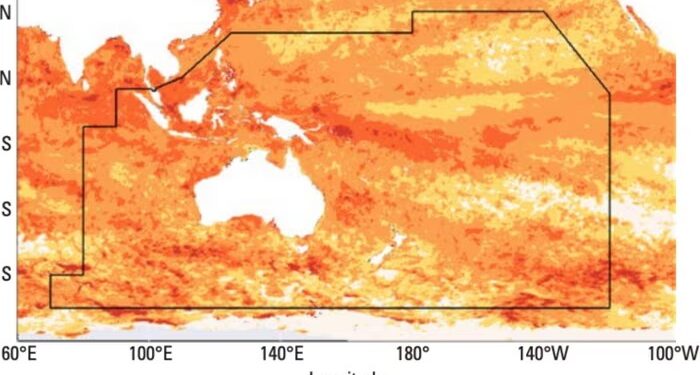London – Scientists are today sounding a grave warning following the discovery of an unprecedented marine heatwave, a colossal expanse of superheated ocean water estimated to be five times the size of Australia. This alarming phenomenon, identified through satellite monitoring and ocean buoy data, is being directly attributed by researchers to the accelerating impacts of human-induced climate change.
The colossal heatwave, sprawling across a significant portion of a major ocean basin, represents a staggering accumulation of thermal energy. Data indicates that temperatures within this vast area are several degrees Celsius above long-term averages for this time of year, reaching levels never before recorded with such intensity or over such a prolonged period. Oceanographers describe the event as a “true monster,” dwarfing previous marine heatwaves in both scale and persistence. Its discovery underscores the profound and escalating warming of the world’s oceans, which absorb over 90 per cent of the excess heat trapped by greenhouse gases.
Experts from leading climate research institutions are unequivocal in linking this event to anthropogenic climate change. Professor Eleanor Vance, a prominent oceanographer at the University of Southampton, stated, “This isn’t just an anomaly; it’s a stark manifestation of the decades of carbon emissions. Our oceans are on the frontline of climate change, and this heatwave demonstrates a terrifying new level of heat absorption. It’s the planet screaming for attention.” The warming is a direct consequence of the build-up of carbon dioxide and other greenhouse gases in the atmosphere, intensifying the greenhouse effect and transferring vast amounts of heat into the marine environment.
The implications of such an immense marine heatwave are predicted to be catastrophic for ocean ecosystems and, by extension, for global climate patterns. Already, preliminary reports indicate widespread distress among marine life within the affected region. Coral reefs, sensitive to even slight temperature increases, are highly vulnerable to extensive bleaching events, potentially leading to irreversible damage. Fish populations may be forced to migrate en masse in search of cooler waters, disrupting delicate food webs and posing severe challenges for commercial fisheries.
Beyond biodiversity, these superheated ocean zones have the potential to significantly influence global weather systems. Warmer ocean waters can fuel more intense and frequent extreme weather events, including tropical cyclones and torrential rainfall, impacting coastal communities far from the epicentre of the heatwave. Changes in ocean currents, critical for distributing heat and nutrients around the planet, could also have long-term and unpredictable consequences for regional climates.
This discovery serves as a chilling reminder of the urgency of addressing the climate crisis. It highlights that the Earth’s systems are reacting to human activity in increasingly dramatic and unforeseen ways. The resilience of marine environments is being tested to its limits, and events like this vast heatwave suggest that tipping points may be closer than previously imagined. Without immediate and drastic cuts to greenhouse gas emissions, scientists warn that such extreme ocean heating events will become more frequent, more intense, and ultimately, irreversible, pushing marine ecosystems towards collapse and accelerating broader climate destabilisation.
newshub finance



Recent Comments